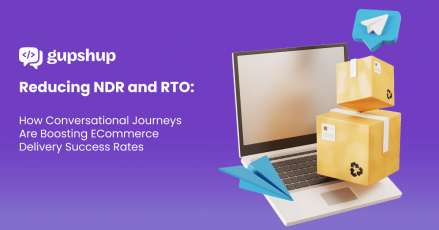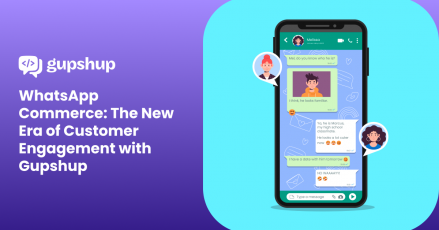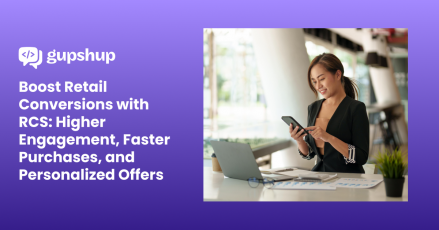WhatsApp Template: Creating Effective Utility, Marketing, and Authentication Messages

WhatsApp with its massive global user base and versatile functionality has revolutionized the way we communicate in the digital age. Having evolved into a crucial channel for business communication, the WhatsApp API has bridged the gap between companies and their customers. Furthermore, the usage of WhatsApp templates, can further enhance this connection, delivering timely, personalized messages that resonate with customers, fostering engagement, and building stronger relationships.
Thus, the WhatsApp Business API has equipped businesses with a powerful tool to facilitate seamless and secure communication between businesses and their customers. It supports various use cases, from customer support and notifications to marketing campaigns and secure authentication processes.
This blog delves into three primary types of WhatsApp API templates: utility, marketing, and authentication, highlighting their significance and practical applications.
Understanding WhatsApp API Templates
If your business is tapping into the power of WhatsApp API for marketing or customer support, you might be aware of message templates. If you’re not, don’t fret! We’re here to enlighten you.
WhatsApp API templates are pre-approved message formats that businesses can use to communicate with their customers.

As of February 2023, WhatsApp has streamlined its message templates into four primary categories: Utility, Marketing, Authentication, and Service. Let’s break these down:
- Utility: Used for transactional messages to keep your customers in the loop with essential order updates, shipping status, about their accounts, orders, appointment reminders, and important alerts.
- Marketing: Elevate your brand by sending promotional content, announcing new products, and offering special deals to captivate your audience. For instance, promotional messages, including special offers, product launches, and loyalty programs
- Authentication: Safeguard your users’ accounts with secure verification codes and authentication messages, such as sending OTPs (One-Time Passwords) for account verification and secure logins.
- Service: Facilitate user-initiated conversations to efficiently address customer queries and support requests.
Marketing, utility, authentication, and service conversations are open for 24 hours unless they are closed by initiating a new free-entry point conversation.
Free-entry point conversations remain open for 72 hours.
Importance of Using Pre-Approved Templates
Using pre-approved templates ensures compliance with WhatsApp’s policies and enhances user experience by delivering clear, concise, and relevant information. These templates also streamline the approval process, allowing businesses to communicate more efficiently.
Advantages of Using Templates via WhatsApp Business API
- Enhanced Customer Engagement: Direct and personalized communication helps in building stronger relationships with customers.
- Cost Efficiency: Automating communication reduces operational costs and improves efficiency.
- High Open Rates: Messages on WhatsApp have higher open and response rates compared to traditional communication channels like email.
In this article, we’ll further zoom in on utility, marketing, and authentication templates within the WhatsApp API framework.
Utility Templates: Streamlining Communication
Utility templates are pre-approved messages tailored to specific transactions. They serve to confirm, suspend, or modify transactions or subscriptions. These templates are operational, focusing on functionality rather than promotion.
It’s important to note that if a template contains both marketing and utility elements, it will be classified as a marketing template.
Use Cases for Utility Templates
Utility templates are crucial for keeping customers informed and engaged through:
- Notifications: Sending order updates, shipping statuses, and appointment reminders.
- Customer Support: Resolving queries and providing support efficiently.
- Alerts and Confirmations: Sending important alerts and confirmations such as payment receipts and account updates.
Designing Effective Utility Templates
Effective utility templates should prioritize clarity, conciseness, and relevance. Here are some best practices:
- Clarity: Use straightforward language to ensure the message is easily understood.
- Conciseness: Keep messages brief and to the point.
- Relevance: Ensure the information is pertinent to the recipient.
Let’s explore some examples of messages that fit within the utility template category:

Marketing Templates: Driving Engagement and Sales
Marketing templates are known for their versatility. Unlike utility templates, they aren’t linked to a specific transaction. Instead, they cover a wide range of communications related to the business and its products or services. This includes promotions, special offers, welcome and farewell messages, updates, invitations, suggestions, and calls to action for new transactions or responses.
Here’s an important note: if a template mixes utility and marketing content, it will be classified as a marketing template. Essentially, any conversation that doesn’t fit into the utility or authentication categories is considered a marketing conversation.
Leveraging WhatsApp API for Business Marketing
WhatsApp Business API can significantly boost marketing efforts through:
- Targeted Campaigns: Sending special offers, new product launches, and personalized recommendations.
- Customer Engagement: Running loyalty programs and sending event invitations to engage customers.
- WhatsApp Business API for Lead Generation: The WhatsApp Business API can be a powerful tool for lead generation by collecting and nurturing leads. It can engage potential customers through personalized messages and send follow-up messages to guide leads through the sales funnel.
Crafting Compelling Marketing Templates
Personalization and timing are key to successful marketing messages. Here are some do’s and don’ts:
- Do’s:
- Personalize messages with the recipient’s name and preferences.
- Send messages at optimal times when users are likely to engage.
- Don’t:
- Spam users with frequent messages.
- Send irrelevant or generic content.
Now, let’s look at some examples of messages that fall under the marketing template category:

Authentication Templates: Ensuring Security and Trust
Authentication messages are essential for businesses to securely verify users with one-time passcodes, often at multiple steps during the login process. Thus, authentication templates are used for account verification, account recovery, and integrity challenges.
Authentication templates sent via WhatsApp Business API include the following elements:
- Fixed preset text: “<VERIFICATION_CODE> is your verification code.”
- Optional security disclaimer: “For your security, do not share this code.”
- Optional expiration warning: “This code expires in <NUM_MINUTES> minutes.”
- Button options: You can choose to include a one-tap autofill button, a copy code button, or no button at all if utilizing zero-tap.

However, it’s important to remember that authentication templates are the most strictly regulated among the different template types.
To use an authentication template, businesses must adhere to content restrictions. URLs, media, and emojis are not allowed in authentication templates or their parameters. Additionally, parameters must be no longer than 15 characters.
These restrictions ensure that authentication messages are concise and secure.
Importance of Authentication in Digital Communication
In an era where digital transactions are commonplace, securing user accounts and transactions is paramount. Authentication templates play a crucial role in building trust through verified communications.
Authentication templates typically include OTPs, account verification messages, and secure login alerts.
Best Practices for Authentication Templates
- User-Friendly Language: Ensure the message is easy to understand.
- Clear Instructions: Provide step-by-step instructions for the user to follow.

Conclusion
WhatsApp API templates offer a powerful means to enhance customer engagement, streamline operations, and secure communications. Leveraging utility, marketing, and authentication templates, businesses can create more meaningful and effective interactions with their customers.
Emerging trends such as AI-driven personalization and enhanced automation will continue to shape the future of WhatsApp Business API.
Businesses are encouraged to stay ahead by exploring these opportunities and integrating Gupshup’s WhatsApp API solutions into their communication strategies. For further resources or support in implementation, feel free to contact us or explore additional guides and tutorials available online.
Making an effective usage of WhatsApp API templates, businesses can not only improve user engagement but also drive growth and build lasting customer relationships. The future of business communication is here, and Gupshup is at the forefront of this transformation.
Here’s a curated list of resources to help you master WhatsApp Business messaging:






